How to sort data in MySQL
1. Basic use of sorting
When querying data, if no sorting operation is used, by default SQL will arrange the query results in the order in which tuples are added.
To perform sorting operations in SQL, you can use the keyword ORDER BY.... After this keyword, you can add the keyword ASC (ascend) to indicate ascending order (from small to large), and DESC (descend) to indicate descending order (from large to small).
If ASC or DESC is not added after the ORDER BY... keyword to indicate ascending or descending order, SQL will default to ascending ASC order. As shown in the following code:
SELECT employee_id, last_name, salary FROM employees ORDER BY salary;
Query results:
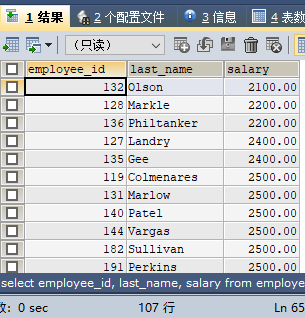
employees The employee's employee_id, last_name, salary and department_id information. And sort by salary from largest to smallest (descending order).
SELECT employee_id, last_name, salary FROM employees ORDER BY salary DESC;
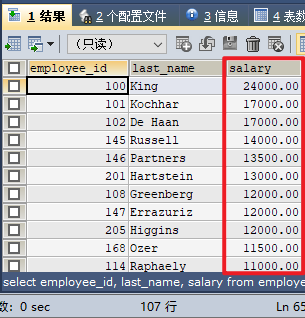
annual_salary), or some field names are really too long, using short aliases can improve the efficiency of our programming. As shown in the following example:
employee_id, last_name, and monthly salarysalary# of the employees in the employee table employees ## and annual salaryannual_salary information. And sorted by annual_salary from largest to smallest (descending order). <div class="code" style="position:relative; padding:0px; margin:0px;"><pre class='brush:php;toolbar:false;'>SELECT employee_id, last_name, salary,
salary * (1 + IFNULL(commission_pct, 0) * 12) AS "annual_salary"
FROM employees
ORDER BY annual_salary DESC;</pre><div class="contentsignin">Copy after login</div></div> Query results:
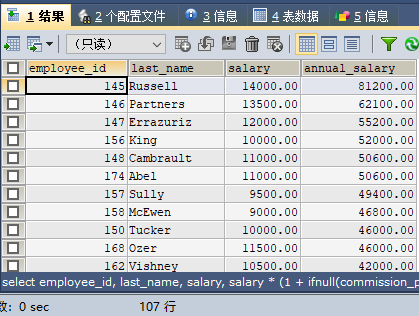 [Note]
[Note]
- Format requirements,
- WHERE
Must be declared after
FROM. The alias of the column can only be used in - ORDER BY...
, not in
WHERE. **If you use column aliases inWHERE, SQL will report an error. So why can’t column aliases in MySQL be used inWHERE? The reasons are as follows: [Cause]
SELECT employee_id, last_name, department_id FROM employees WHERE department_id IN(50, 60, 70) ORDER BY department_id DESC;
- In SQL, the execution order of query statements does not follow the above code from line 1 to line 1 4 lines in order from top to bottom. Instead, first execute line 2 FROM... and first find the table to be queried.
- Execute line 3 WHERE... to filter tuples that meet the conditions.
- Then execute line 1 SELECT... to display the fields you want to query. Because the column alias is generated only in this step, the WHERE statement it provides cannot be used in the previous step. But it can be used in the next step of ORDER BY.
- Finally, the 4th row is ORDER BY... , sorted by a certain column. At this time, you can use column aliases for sorting.
- Query results:
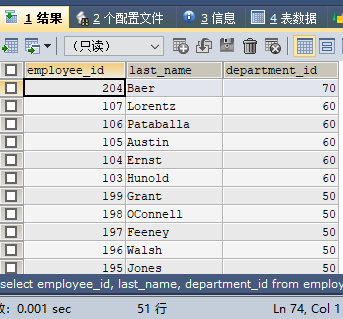 3. Second-level sorting
3. Second-level sorting
In real life, sometimes we need Sort by one field and then by another field. In SQL we can use secondary sorting to achieve this. Please see the following example for usage:
[Example 1] Query the employee ID
employee_id, name ## and so on. You can add a comma after The above is the detailed content of How to sort data in MySQL. For more information, please follow other related articles on the PHP Chinese website!last_name, of the employees in the employee table employees, Monthly salary salary and department ID department_id. And first sort by department ID department_id in descending order, and then sort by salary from large to small (descending order). SELECT employee_id, last_name, salary, department_id
FROM employees
ORDER BY department_id DESC, salary DESC;
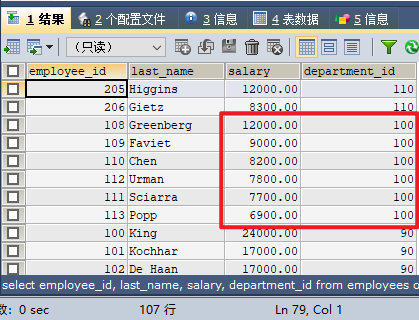 ORDER BY
ORDER BY

Hot AI Tools

Undresser.AI Undress
AI-powered app for creating realistic nude photos

AI Clothes Remover
Online AI tool for removing clothes from photos.

Undress AI Tool
Undress images for free

Clothoff.io
AI clothes remover

Video Face Swap
Swap faces in any video effortlessly with our completely free AI face swap tool!

Hot Article

Hot Tools

Notepad++7.3.1
Easy-to-use and free code editor

SublimeText3 Chinese version
Chinese version, very easy to use

Zend Studio 13.0.1
Powerful PHP integrated development environment

Dreamweaver CS6
Visual web development tools

SublimeText3 Mac version
God-level code editing software (SublimeText3)

Hot Topics
 MySQL's Role: Databases in Web Applications
Apr 17, 2025 am 12:23 AM
MySQL's Role: Databases in Web Applications
Apr 17, 2025 am 12:23 AM
The main role of MySQL in web applications is to store and manage data. 1.MySQL efficiently processes user information, product catalogs, transaction records and other data. 2. Through SQL query, developers can extract information from the database to generate dynamic content. 3.MySQL works based on the client-server model to ensure acceptable query speed.
 Laravel Introduction Example
Apr 18, 2025 pm 12:45 PM
Laravel Introduction Example
Apr 18, 2025 pm 12:45 PM
Laravel is a PHP framework for easy building of web applications. It provides a range of powerful features including: Installation: Install the Laravel CLI globally with Composer and create applications in the project directory. Routing: Define the relationship between the URL and the handler in routes/web.php. View: Create a view in resources/views to render the application's interface. Database Integration: Provides out-of-the-box integration with databases such as MySQL and uses migration to create and modify tables. Model and Controller: The model represents the database entity and the controller processes HTTP requests.
 How to start mysql by docker
Apr 15, 2025 pm 12:09 PM
How to start mysql by docker
Apr 15, 2025 pm 12:09 PM
The process of starting MySQL in Docker consists of the following steps: Pull the MySQL image to create and start the container, set the root user password, and map the port verification connection Create the database and the user grants all permissions to the database
 Solve database connection problem: a practical case of using minii/db library
Apr 18, 2025 am 07:09 AM
Solve database connection problem: a practical case of using minii/db library
Apr 18, 2025 am 07:09 AM
I encountered a tricky problem when developing a small application: the need to quickly integrate a lightweight database operation library. After trying multiple libraries, I found that they either have too much functionality or are not very compatible. Eventually, I found minii/db, a simplified version based on Yii2 that solved my problem perfectly.
 How to install mysql in centos7
Apr 14, 2025 pm 08:30 PM
How to install mysql in centos7
Apr 14, 2025 pm 08:30 PM
The key to installing MySQL elegantly is to add the official MySQL repository. The specific steps are as follows: Download the MySQL official GPG key to prevent phishing attacks. Add MySQL repository file: rpm -Uvh https://dev.mysql.com/get/mysql80-community-release-el7-3.noarch.rpm Update yum repository cache: yum update installation MySQL: yum install mysql-server startup MySQL service: systemctl start mysqld set up booting
 Centos install mysql
Apr 14, 2025 pm 08:09 PM
Centos install mysql
Apr 14, 2025 pm 08:09 PM
Installing MySQL on CentOS involves the following steps: Adding the appropriate MySQL yum source. Execute the yum install mysql-server command to install the MySQL server. Use the mysql_secure_installation command to make security settings, such as setting the root user password. Customize the MySQL configuration file as needed. Tune MySQL parameters and optimize databases for performance.
 MySQL and phpMyAdmin: Core Features and Functions
Apr 22, 2025 am 12:12 AM
MySQL and phpMyAdmin: Core Features and Functions
Apr 22, 2025 am 12:12 AM
MySQL and phpMyAdmin are powerful database management tools. 1) MySQL is used to create databases and tables, and to execute DML and SQL queries. 2) phpMyAdmin provides an intuitive interface for database management, table structure management, data operations and user permission management.
 Laravel framework installation method
Apr 18, 2025 pm 12:54 PM
Laravel framework installation method
Apr 18, 2025 pm 12:54 PM
Article summary: This article provides detailed step-by-step instructions to guide readers on how to easily install the Laravel framework. Laravel is a powerful PHP framework that speeds up the development process of web applications. This tutorial covers the installation process from system requirements to configuring databases and setting up routing. By following these steps, readers can quickly and efficiently lay a solid foundation for their Laravel project.






